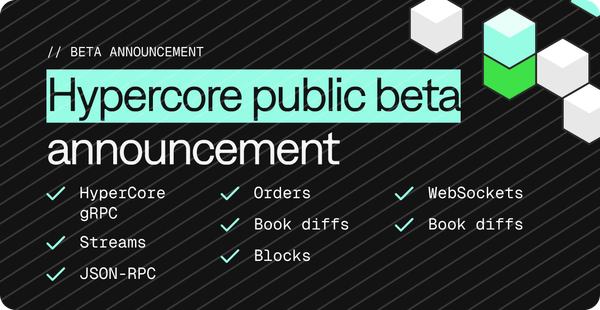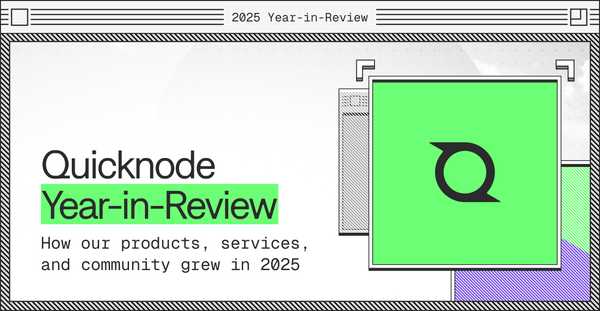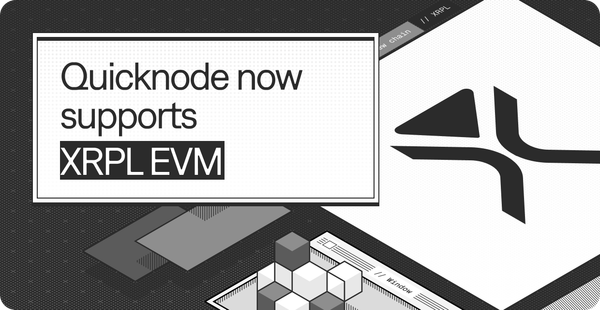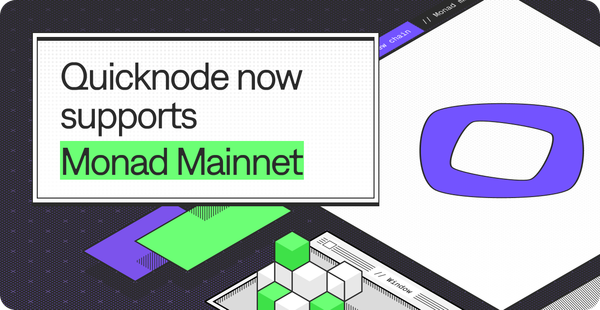Fuel: the modular execution layer for the Ethereum Ecosystem
Build game-changing apps on Fuel with QuickNode. Harness Fuel's lightning-fast, secure, and scalable technology to turn your ideas into reality.
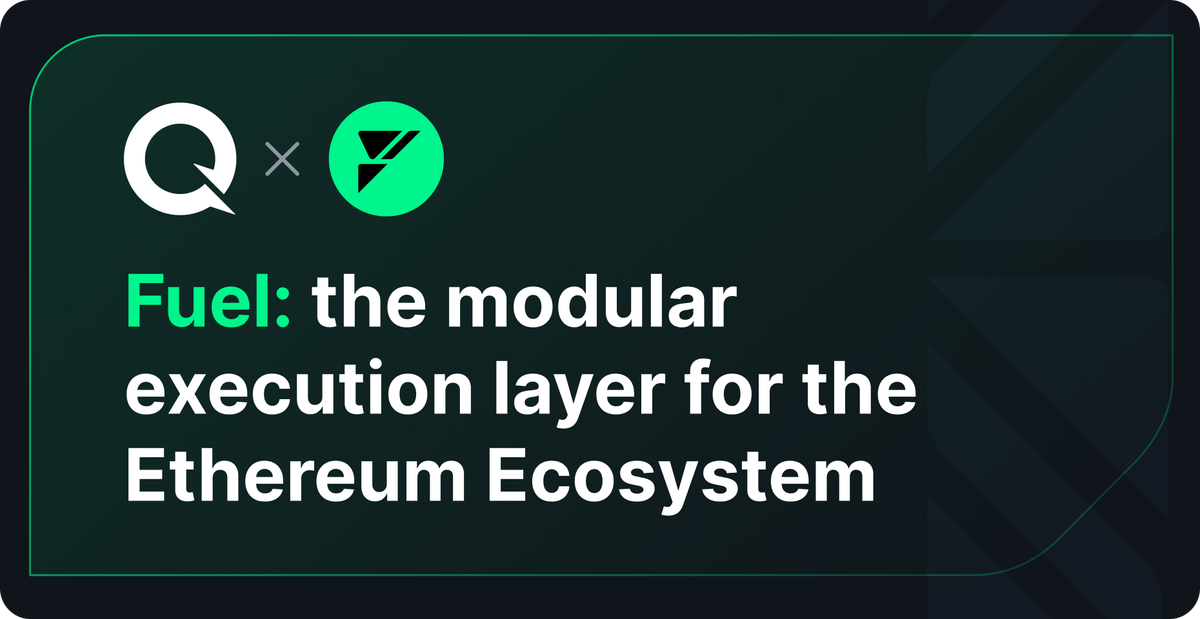
The demand for faster, more efficient blockchain solutions is growing as dApps become increasingly mainstream. Existing platforms often need help with high transaction fees and slow processing times, hindering user experience and widespread adoption. There's a clear need for innovative technologies that can overcome these limitations and pave the way for scalable, user-friendly blockchain applications.
Fuel emerges as a robust modular execution layer designed to enhance the Ethereum ecosystem. By leveraging advanced technologies like optimistic rollups and a unique transaction model, Fuel dramatically boosts transaction throughput while reducing gas costs. This makes blockchain interactions more accessible and efficient for users and developers alike.
Now, let's dive deeper into what Fuel brings to the table.
What is Fuel?
Fuel is a next-generation blockchain platform designed from scratch to enhance the scalability and performance of dApps within the Ethereum ecosystem. By introducing a modular execution layer and leveraging advanced technologies like optimistic rollups, Fuel aims to significantly increase transaction throughput and reduce gas fees without compromising security or decentralization. Its innovative approach addresses the limitations of current blockchain architectures, making it a pivotal development for the future of scalable blockchain solutions.
Some features of Fuel:
Modular Execution Layer Architecture
Fuel introduces a modular execution layer that separates the execution of transactions from data availability and consensus. This architectural innovation allows each blockchain component to be optimized independently, significantly improving overall system performance. By decoupling these layers, Fuel enables scalability, flexibility, and interoperability. Scalability is achieved through specialized optimization of the execution layer, allowing Fuel to handle more transactions than monolithic blockchains. Flexibility is afforded to developers who can customize and upgrade individual modules without affecting the entire system, fostering innovation and adaptability. Interoperability is enhanced by the modular design, which facilitates more straightforward integration with other blockchains and layer-2 solutions, thus improving the interconnectedness of the blockchain ecosystem.
Optimistic Rollup Technology
Fuel leverages optimistic rollups to increase transaction throughput and reduce gas costs. Optimistic rollups work by processing transactions off-chain and submitting them to the main Ethereum chain in batches. This approach offers several benefits, including efficiency, cost-effectiveness, and security. Efficiency is gained as off-chain transaction processing reduces the computational load on the main chain, leading to faster confirmation times. Cost-effectiveness comes from batching transactions, which minimizes gas fees and makes micro-transactions and complex smart contract interactions more economically viable. Security is maintained because, while transactions are processed off-chain, the optimistic rollup mechanism ensures that fraudulent transactions can be identified and challenged, maintaining the integrity of the blockchain.
GraphQL-Based Interaction Model
Fuel uses GraphQL as its primary interface for blockchain interactions, moving away from the traditional JSON-RPC or REST APIs commonly used by other platforms like Ethereum. This modern approach offers significant benefits in terms of developer experience and network efficiency. GraphQL allows developers to make precise and efficient queries, fetching exactly the data they need in a single request. This reduces unnecessary data transfer and optimizes network performance, aligning with Fuel's commitment to enhancing scalability and speed.
UTXO-Based Transaction Model
Unlike Ethereum's account-based model, Fuel employs a UTXO (Unspent Transaction Output) model, similar to that of Bitcoin. This model offers distinct advantages like parallel processing, enhanced security, and simplified state management. Parallel processing is possible because the UTXO model allows transactions to be processed simultaneously, significantly increasing throughput and performance. Enhanced security is achieved through the deterministic nature of UTXO transactions, which reduces the risk of certain types of attacks and errors in smart contract execution. Simplified state management is realized by managing unspent outputs, simplifying the tracking of funds, and reducing the complexity associated with account balances.
Innovative Development Tools: Sway Language and FuelVM
Fuel introduces its own virtual machine, FuelVM, and a domain-specific language called Sway for smart contract development. FuelVM is designed for high performance, executing transactions more efficiently than the traditional Ethereum Virtual Machine (EVM), thus optimizing resource usage and execution speed. Sway is a Rust-based programming language offering modern features, strong typing, and improved safety guarantees. It simplifies the development process and reduces the likelihood of vulnerabilities in smart contracts. With comprehensive tooling and documentation, Fuel provides a developer-friendly environment for building, testing, and deploying scalable decentralized applications with ease.
Why QuickNode for Fuel Development?
Anyone can build on Fuel by signing up for a QuickNode account and creating a Fuel GraphQL endpoint. The following are the benefits of using QuickNode for Fuel development:
- Dedicated Endpoints: Public endpoints are great for getting started, but since they are free and available to everyone, they are rate-limited to avoid abuse from a single user. With QuickNode, you can create a dedicated endpoint to interact with Fuel nodes. So, you don't hit those rate limits on the public endpoints.
- Free Tier: Anyone can get started with a free forever plan.
- Speed & Stability: With QuickNode's robust infrastructure, you won't have to worry about higher latencies and node stability. See how QuickNode's performance stacks up for yourself with the comparison tool.
- Scalability & Reliability: With nodes in 14+ regions and load-balancing solutions under the hood, QuickNode scales with your dApp traffic.
- Wide suite of Web3 tools: Along with blockchain read and write via GraphQL, users can also use Streams to set up robust blockchain data delivery systems without having to set up their own ETL pipelines. With Clusters, go beyond normal endpoints and get an entire dedicated cluster of Fuel nodes, which is truly unmetered, isolated for your use, and scalable. With Functions, create your blockchain serverless functions in the cloud without hosting it on your infrastructure.
- Developer Resources: Easing the development process with products and education. With robust products, QuickNode offers high-quality developer resources in written and visual formats.
Create A Fuel Endpoint on QuickNode
Step 1: Sign up for a QuickNode account (if you don't already have one)
Step 2: After verifying the email, click on `Create endpoint`

Step 3: Select the Fuel chain and click `Continue`
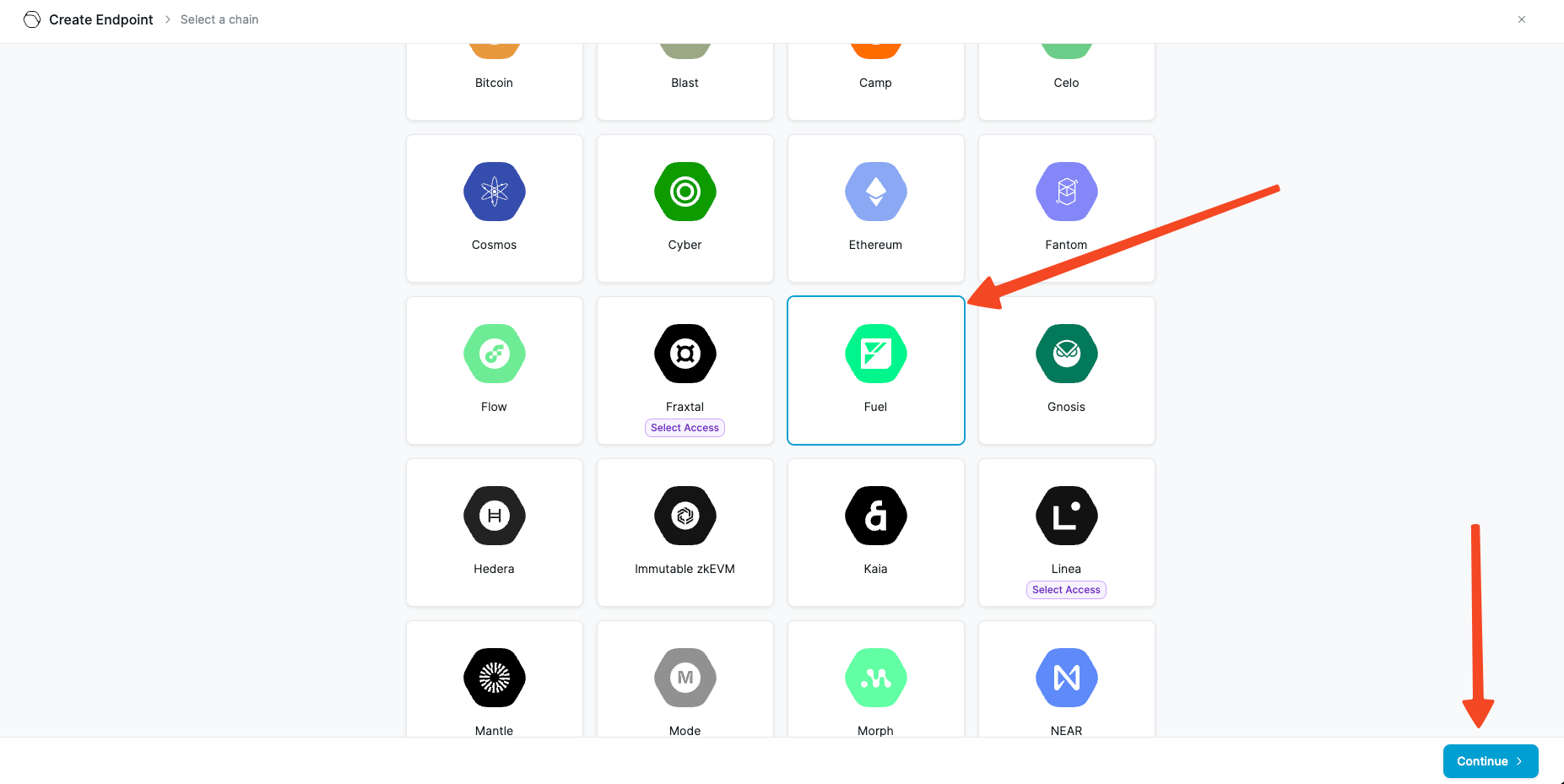
Step 4: Select the network and click `Continue`
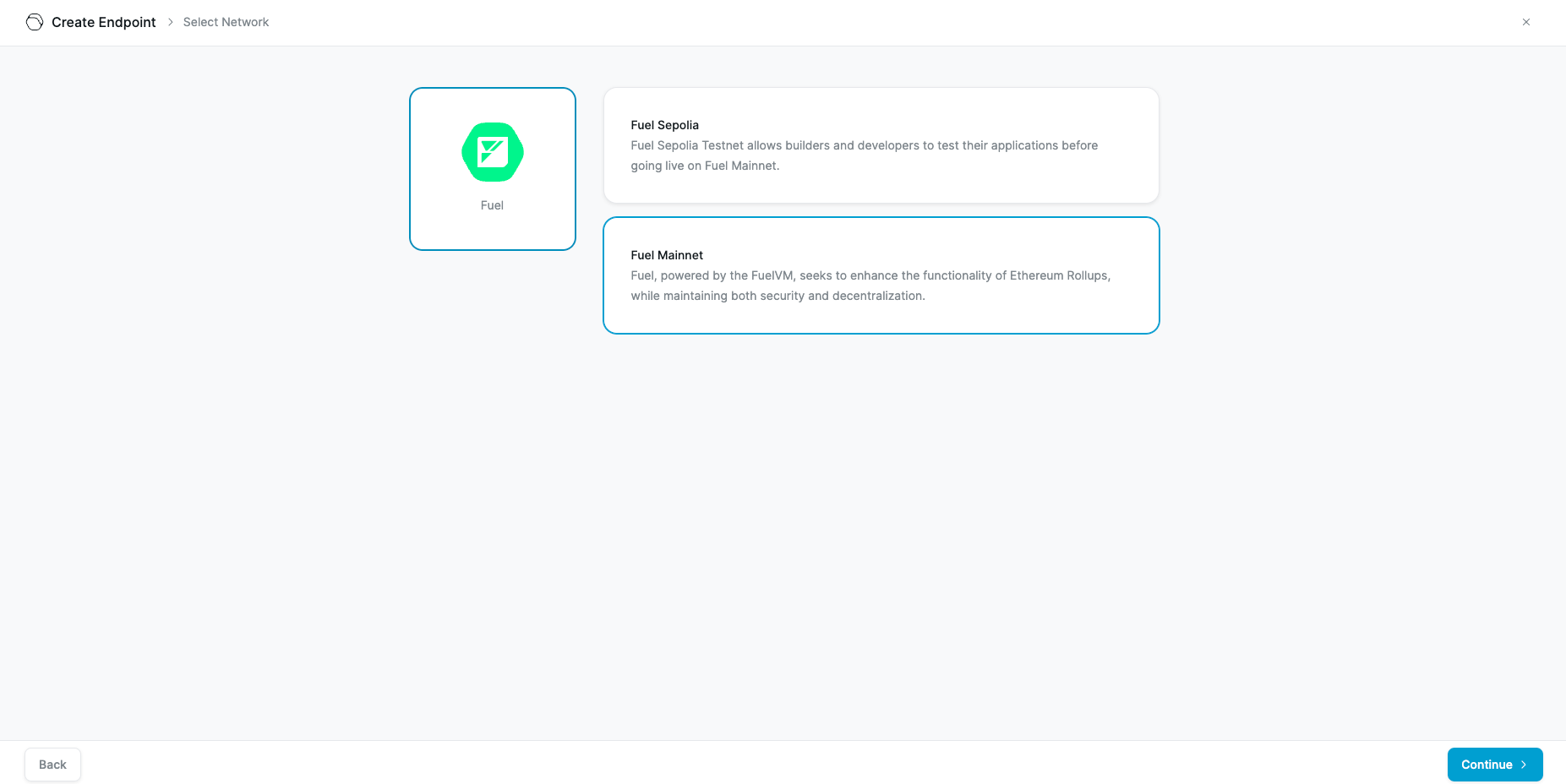
Once your Fuel endpoint is ready, it will look like this. You can interact with the Fuel chain using an HTTPS endpoint.
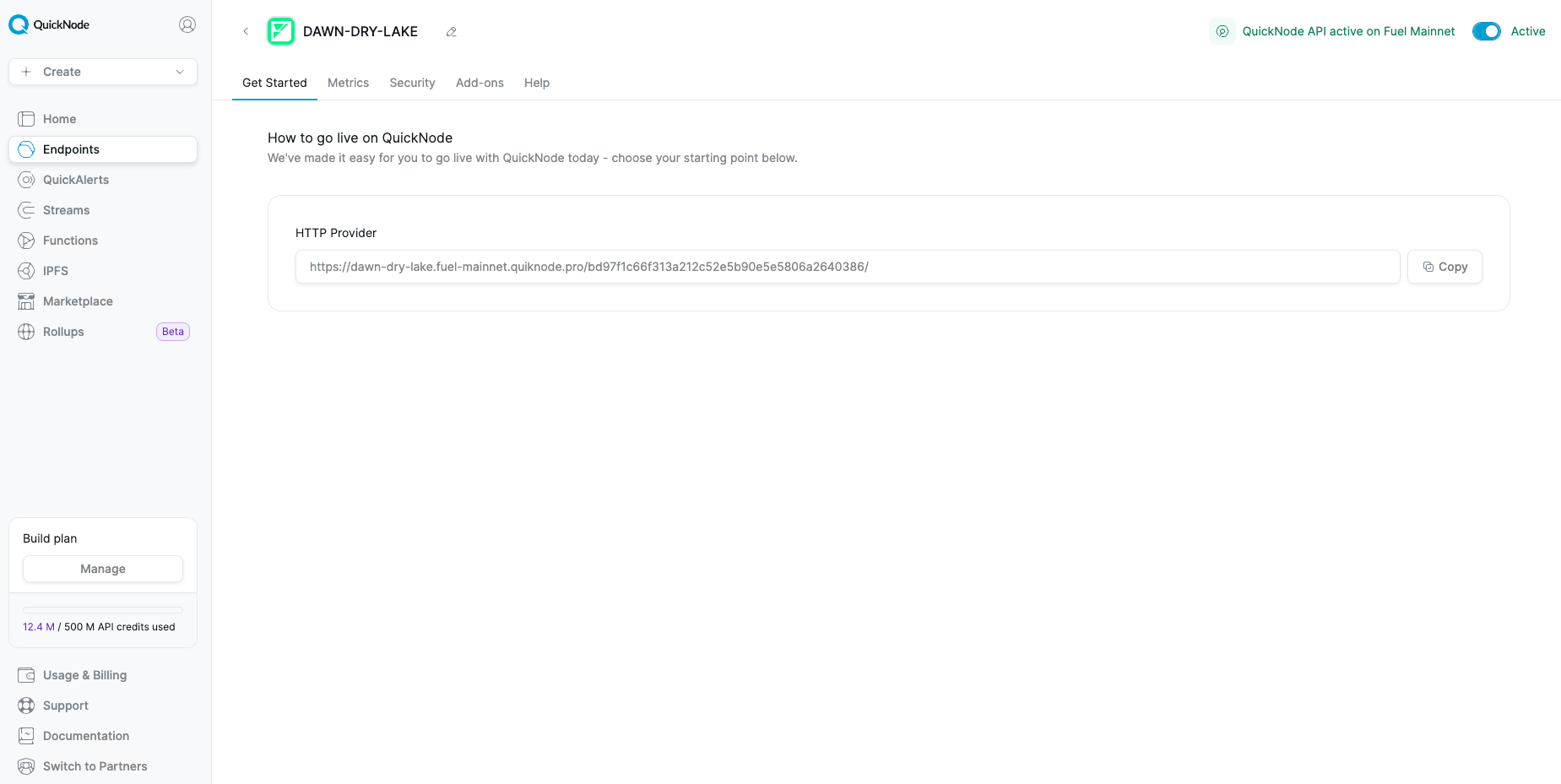
Resources
Why QuickNode?
QuickNode makes blockchain infrastructure easy, freeing developers to focus on the dApps (decentralized applications) they’re building instead of everything that goes into running blockchain infrastructure, such as DevOps/NodeOps, uptime, scaling, security, and tooling.
By eliminating the headache of node maintenance and synchronization and providing a comprehensive, end-to-end platform, we save developers valuable time, get a high-quality dApp to market faster, and help businesses scale and execute their Web3 strategies.
QuickNode is an indispensable tool in a Web3 developer’s arsenal that was created by developers for developers and battle-tested by industry-leading projects.
Today, the QuickNode network processes over 200 billion requests per month across 40+ networks in 14+ regions worldwide.
Visit QuickNode.com for more information.

About QuickNode
QuickNode provides the tools and resources builders need to create incredible products. With a globally balanced infrastructure, guaranteed reliability, a user-friendly interface, and end-to-end customer support, QuickNode allows enterprises to realize their ideas on the chain rapidly.
Learn more about QuickNode’s rollup offerings: Build your own custom blockchain | QuickNode.


